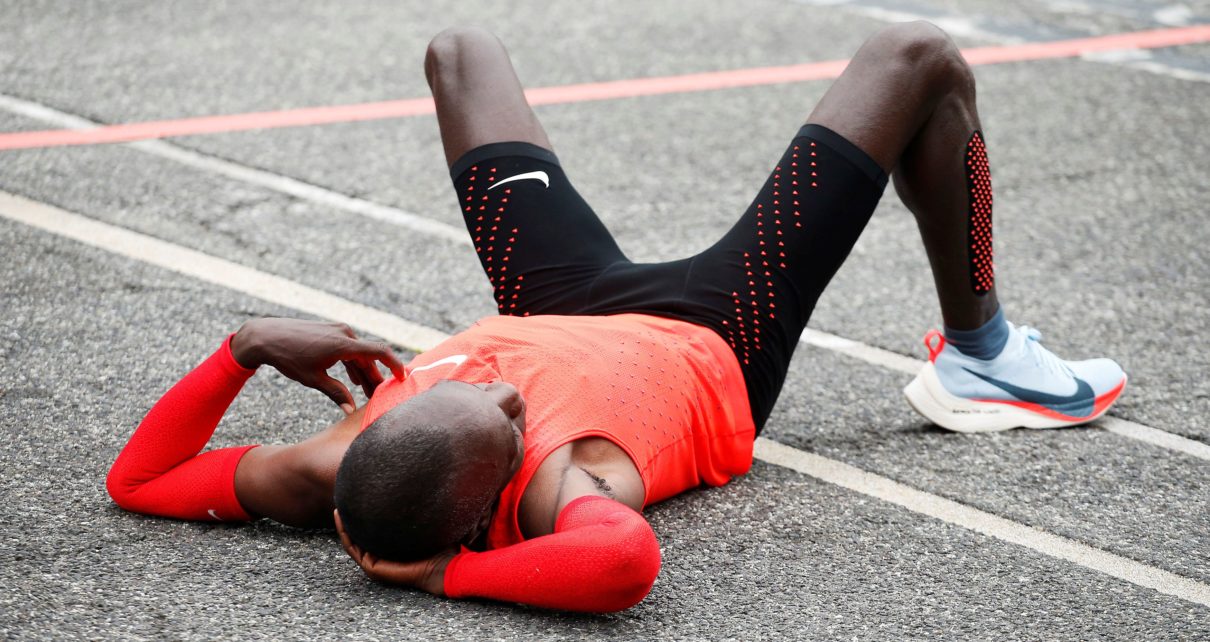Dutchman Armand Bettonviel, the best sports nutritionist, was hired to contain his bowels
By Idris ‘Shoes’ Lule
Roving Editor
Marathons often induce diarrhea. Constant limb movement and tension of expectations combine to induce bowel movement. This can excite a running stomach, the kind that can see Eliud Kipchoge deviating from the pacemakers and sprinting in search of a bush in lush Vienna, Switzerland, venue of the 2019 INEOS 1:59 Challenge in which he will be attempting to run 42 kilometres in under two hours this Saturday.
If Kipchoge experiences gastrointestinal issues, then three months of training, celibacy, millions of pounds spent on experts and a world waiting to see history being made in their lifetime will go up in smoke…because of kuendesha!
And it can be embarrassing. During the 2016 Rio Olympics in Brazil, French race walker Yohann Diniz, took the lead, but alas! collapsed and soiled himself mid-walk!
Then there was China’s Wu Xiangdong who felt unwell after 10 kilometres and began relieving himself past the 14 kilometre mark during the 2019 Shanghai International Half Marathon. “Even I couldn’t stand the smell,” he told South China Morning Post. “I kept running and didn’t stop (to go to the toilet because there weren’t any) and I wanted to beat the African runner at the finish…I was really relieved when I crossed the finish line.”
Running causes a span of digestive issues
The success of the INEOS 1:59 Challenge depends on milliseconds which can be wasted on bowel issues.
But Sir Richard Radcliffe, the British billionaire bankrolling the INEOS 1:59 Challenge left nothing to chance. He hired Dutchman Armand Bettonviel, the best known nutritionist for elite athletes to over the liquids and diet is right for optimal metabolism during the marathon.
Listen to Ellen Airhart in her 2017 article; why to runners get the runs? In Popular Science magazine: “Running causes a span of digestive issues that range from heartburn and acid reflux to frequent bowel movements. The most common, however, are those in the lower digestive system, which includes the small and large intestines. These issues can be as mild as bloating and flatulence to as severe as bloody stools.”
But what is the connection between running and running stomach?
Well, Aihart informs us on good authority that our delicate digestive organs might not get enough blood during physical exercise, a known as ischemia. “During an intense run, the skin and large muscles are the most urgent recipients whereas the intestines don’t get much attention…the lack of blood compromise the mucus that lines the intestines, making it more permeable and prone to disturbance.”
Sadly, there are no tablets to deter bowels from running during a marathon as it’s physiologically beyond a runner to direct flow of blood to the intestines. This is where eminent nutritionist Armand Bettonviel will come in with his degree in physiology and nutrition from Stirling University in the UK.
Armand’s brief has zeroed in on Kipchoge’s drinks and diet and their effect on his digestive system during the marathon. And just why a private Gulfstream jet came to pick Kipchoge to ensure he doesn’t take over refrigerated airline food and drinks.
To arrest intestinal distress, some athletes avoid coffee and dairy products-never mind one Kenyan marathoner during the 2012 London Olympics gave mzungu dieticians a hard time: he requested for fresh milk from a cow which has just given birth! Is it any wonder that the eventual winner was not the Kenyan, but Uganda’s Stephen Kiprotich in 2:08:01?

